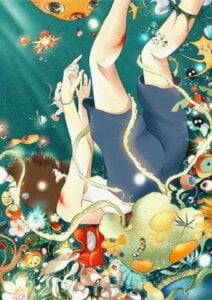Level 3 Diploma in Digital Creative Arts
Ready to apply?
- Course Overview
- Entry Requirements
- Course Fees
COURSE OVERVIEW:
This BTEC Level 3 in Digital Art course is equivalent to 3 A-Levels. It provides structure for learning in the practice of illustration and digital arts encouraging your creative practice to grow from learning shared in our studio together. The course ethos is to maximise opportunities presented by art study, whilst ensuring the core elements of the subject and undergraduate opportunities are provided. The structure and ethos has been developed to provide students with a comprehensive journey in digital illustration that seeks to examine personal practice in relation to the constantly evolving nature of the subject globally and culturally. This underpins how learning is delivered, the structure of modules and how the content within them is experienced.
You will learn by considering the similarities and differences between how illustrators work today; developing a critically informed practice through projects and briefs that challenge your understanding of what it means to be a digital artist in our current digital age.
These briefs promote a sophisticated appreciation of diversity and cultural difference expressed through imaginative, compelling and effective visual communication in whatever area of digital illustration practice you decide to pursue. Students will be encouraged to see problems from new perspectives and build the skills to implement their ideas in innovative and creative ways. The course is designed by a practicing illustrator who ensures the learning experience on the BTEC is both current and highly connected, maximising students opportunities to attend higher education.
We embrace the opportunities and the challenges introduced by rapidly changing technologies. These are transforming illustration practice and the wider visual communications industries, and also how images and visual narratives are circulated, interpreted and consumed. Whether building upon traditional fields or responding to new or emergent media, audiences and markets, the course structure accelerates, motivates and encourages students to take their next creative leap; developing a practice and career path that is adaptive and forming a new step in their professional journey and life.
The course covers 4 units over two years of study:
- Skills Development
- Creative Project
- Personal Progression
- Creative Industry Response
COURSE CONTENT:
Lectures: Introduce key ideas and issues to provide orientation through the presentation of core topics. Lectures are always set in the context of an activity, dialogue or other opportunity to create critical reflection and dialogue amongst and between students and teaching staff.
Guest talks: from practitioners, industry professionals and undergraduate students provide relevant and current insights into the subjects and complement discussion seminars.
Learning activities: provide guided opportunities to apply and interrogate newly learned concepts, for peer and tutor feedback on the group’s work, and engagement with readings and resources to help you structure your ideas.
Small group and class discussions: provide a forum for interaction, dialogue and debate, reflection and critical feedback. We allow you to present your work in progress, testing assumptions, ideas and methodologies, to develop your research, and to receive feedback from peers and tutors.
Practice-based workshops: deliver relevant skills to support you to explore a range of Illustrative practices – these will cover both autographic and digital approaches to illustration.
Individual and group tutorials: are regularly available throughout the course. You will be allocated a Personal Tutor
Independent study: is an important part of the course and is self-directed research, including critically informed reflection and ongoing practical and contextual research. We encourage you to research and explore material for use in a variety of ways, e.g. in preparation for seminars, assignments and for your FMP project. This provides opportunities for you to investigate relevant areas of interest in more depth and to demonstrate autonomous learning.
Self-evaluation and peer feedback: Critical reflection is encouraged throughout the course via a process of self-evaluation. Peer feedback is a critical aspect of study and development, developing key skills in professional development, constructive criticism, relationship building and personal communications strategies.
Professional networking: You are encouraged to build a professional network through the duration of the course. This network may include commercial connections within the visual communication industries but may also include practicing illustrators.
PROGRESSION:
Potential progression pathways into University include:
- Graphic Design
- UI/UX Design
- Visual Communication
- Illustration
- Concept Art
- Games Design
- Web Design
- Character Concept Artist
This course is a Study Programme which consists of
- Vocational Qualification
- Work Experience
- Tutorial
- Maths*
- English*
* If you have not already achieved a GCSE pass at grade 4 (C in the old grading structure) or above in English and Maths you will study Maths and/ or English as an integral part of your college programme.
This course requires 4 GCSEs at Grade 4 (C in the old grade structure) or above including an art based subject and one in English or maths.
A relevant Level 2 qualification at Merit Level with GCSE/Level 2 in English & maths. If you have a Pass grade you will complete an additional assessment to check course suitability.
A portfolio of your work is required for presentation at interview.
This course is free for 16-18yrs; for 19-23yrs, course is free if you have not achieved a full Level 2 qualification.
For all other students fees apply:
Course fee £5421; Exam Fee TBC
Find information about Advanced Learner Loans and make an application.
Course Details
Study campus:
City
Study option(s):
Full time
Course level:
Level 3
Can't find the information you're looking for?
Chat with usFind out about programmes, campus life, support and success!
Our FE Course Guide is out now and will help you understand your options and find out what life at Coventry College is like.
Need careers advice?
We can help you get the advice and guidance you need. From choosing the right programme, developing your CV, further study options and career planning.
Making your application
We will check your application to see if you meet the standard entry requirements for the course. If you do, you’ll receive an invitation via email to attend an interview with a Curriculum Tutor.
Fees and funding
If you are aged 16-18 and applying for a full-time programme, then you will not have to pay for your course. If you are aged 19+ then there may be a fee for your course.
Other programmes you might like
Programme Ref: COV_FE_29195 Last updated: February 19, 2024 12:44 pm



